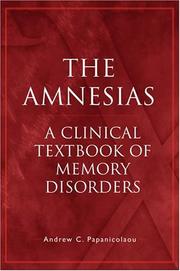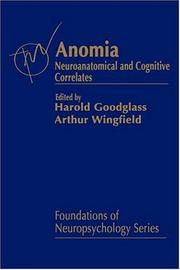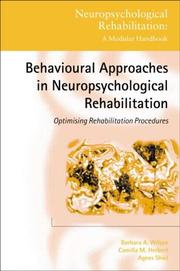| Listing 1 - 10 of 25 | << page >> |
Sort by
|
Multi
ISBN: 9783030989392 9783030989385 9783030989408 9783030989415 Year: 2022 Publisher: Cham Springer International Publishing :Imprint: Springer
Abstract | Keywords | Export | Availability | Bookmark
 Loading...
Loading...Choose an application
- Reference Manager
- EndNote
- RefWorks (Direct export to RefWorks)
This extensively revised second edition provides a comprehensive overview of transient global amnesia (TGA). First, it deals with the history of TGA before moving on to clinical and diagnostic features and differential diagnosis. Subsequent chapters then discuss the investigation and predisposing and precipitating factors for TGA before attempting to synthesise these many strands in order to formulate ideas about the pathogenesis of TGA. Each of the chapters is devoted to a practical and structured overview of the particular topic, with use of case studies to illustrate the material. Based in part on the author's experience of TGA cases over 20 years and in part on a review of the published literature, this book will hopefully enlighten clinicians from a broad range of medical backgrounds on the clinical features, investigation, and pathogenesis of TGA. Transient Global Amnesia is aimed at any clinician with an interest in, or who encounters patients with, acute amnesia: neurologists, general physicians, old age psychiatrists, geriatricians, clinical neuropsychologists, and primary care physicians, as well as other professions allied to medicine with similar interests, such as members of memory assessment teams.
Neuropathology --- neurologie --- hersenen --- Transient global amnesia. --- Amnèsia
Book
ISBN: 0316402370 0316233048 Year: 2013 Publisher: New York, NY : Orbit,
Abstract | Keywords | Export | Availability | Bookmark
 Loading...
Loading...Choose an application
- Reference Manager
- EndNote
- RefWorks (Direct export to RefWorks)
Amnesia --- Fantasy fiction. --- Fantastic fiction --- Heroic fantasy (Fiction) --- Fantasy literature --- Fiction

ISBN: 1280534583 0198038526 9781280534584 9780198038528 0195172450 9780195172454 019770557X 0190291524 Year: 2006 Publisher: Oxford ; New York : Oxford University Press,
Abstract | Keywords | Export | Availability | Bookmark
 Loading...
Loading...Choose an application
- Reference Manager
- EndNote
- RefWorks (Direct export to RefWorks)
This is a clinical text on the disorders of memory that result from psychological stress, traumatic injury, strokes, or degenerative diseases of the brain. Each amnesia syndrome is dealt with in a separate chapter that includes a clear account of the symptoms and the tests used to assess them.
Memory disorders. --- Impairment, Memory --- Memory, Disorders of --- Memory impairment --- Paramnesia --- Cognition disorders --- Amnesia --- Memory --- physiopathology. --- physiology.

ISBN: 9780470015070 9780470015087 Year: 2007 Publisher: Chichester Wiley
Abstract | Keywords | Export | Availability | Bookmark
 Loading...
Loading...Choose an application
- Reference Manager
- EndNote
- RefWorks (Direct export to RefWorks)
Amnesia --- Criminal investigation --- Criminal psychology --- Forensic psychology --- Violent offenders --- Psychological aspects

ISBN: 0122896858 9786611037116 1281037117 0080527272 9780122896859 9780080527277 Year: 1997 Publisher: San Diego : Academic Press,
Abstract | Keywords | Export | Availability | Bookmark
 Loading...
Loading...Choose an application
- Reference Manager
- EndNote
- RefWorks (Direct export to RefWorks)
Anomia is the inability to access spoken names for objects, most often associated with the elderly or those with brain damage to the left hemisphere. Anomia offers the state-of-the-art review of disorders of naming, written by acknowledged experts from around the world, approached from both clinical and theoretical viewpoints. Goodglass, known around the world for his research in aphasia and speech pathology, edits this first book devoted exclusively to naming and its disorders. Wingfield is known for his classic studies of lexical processing in aphasic and normal speakers. The book inc
Anomia. --- Neuropsychiatry. --- Behavioral neurology --- Biological psychiatry --- Neurology --- Amnesiac aphasia --- Amnesic aphasia --- Anomic aphasia --- Dysnomia --- Nominal aphasia --- Amnesia --- Aphasia

ISBN: 1280052473 9786610052479 113543185X 1138883131 020364154X 1135431841 0203691539 1841691836 Year: 2004 Publisher: Abingdon, Oxon : Routledge,
Abstract | Keywords | Export | Availability | Bookmark
 Loading...
Loading...Choose an application
- Reference Manager
- EndNote
- RefWorks (Direct export to RefWorks)
The potential of behavioural approaches for improving the lives of people with acquired brain injury is immense. Here that potential is laid out and explored with a thoroughgoing regard for clinical practice and the theoretical frameworks that underpin that practice. This book will prove an invaluable resource for clinical psychologists and the whole range of therapists working with patients suffering from acquired brain damage.
Brain damage --- Clinical neuropsychology. --- Patients --- Rehabilitation. --- Behavioral neurology --- Neurology, Behavioral --- Clinical psychology --- Neuropsychology --- brain --- injury --- traumatic --- anterograde --- amnesia --- assessment --- severe --- head --- post --- cognitive
Book

ISBN: 2367811172 2367813906 2842699270 9782367811178 9782842699277 Year: 2021 Publisher: Montpellier : Presses universitaires de la Méditerranée,
Abstract | Keywords | Export | Availability | Bookmark
 Loading...
Loading...Choose an application
- Reference Manager
- EndNote
- RefWorks (Direct export to RefWorks)
The idea of India and the Indian diasporic imagination is the product of the rich scholarship being done on the Asian sub-continent, as well as in the many countries where South Asians have settled. The notion of ‘many Indias’ and many diasporas attempts to accommodate people with multiple identities, encompassing a complex amalgam that includes the bewildering diversity of the sub-continent and the challenging hybridity of the places where they have settled. The shaping and reshaping of identities are fundamental to the universal quest to belong and to create new homelands while not eliminating notions of the imagined ancestral homelands. The reality is, as this volume demonstrates, that old conceptions of India, even ‘many Indias’, are now inadequate to accommodate the fluid identities that characterize the Asian sub-continental diasporas. L’idée de l’Inde et de l’imagination diasporique est le résultat des nombreux travaux de recherche réalisés dans le sous-continent indien ainsi que dans les divers pays où s’est installée la diaspora de l’Asie du Sud. Le concept d’une Inde multiple et diasporique tente d’intégrer un peuple aux identités plurielles, amalgame complexe d’un sous-continent indien à la diversité saisissante et de tous les pays d’accueil de cette diaspora hybride. La constitution inlassable des identités fonde cette quête universelle - comment créer de nouvelles attaches, un nouveau chez soi, sans renier ni oublier la patrie remémorée telle qu’elle demeure dans l’imaginaire ? Ce volume démontre que les conceptions anciennes, même celles qui reposent sur une Inde multiple, ne parviennent plus à intégrer les identités fluides qui caractérisent les diasporas de l’Asie du Sud.
Literature --- hybridité --- Caraïbe --- trauma --- Diaspora indienne --- Indo-Guyanais --- Indo-Caribéen --- amnésie --- océan indien --- hybridity --- Caribbean --- amnesia --- Indian Diaspora --- Indo-Guyanese --- Indo-Caribbean --- Indian Ocean
Book
ISBN: 9782889198023 Year: 2016 Publisher: Frontiers Media SA
Abstract | Keywords | Export | Availability | Bookmark
 Loading...
Loading...Choose an application
- Reference Manager
- EndNote
- RefWorks (Direct export to RefWorks)
The study of 5-hydroxytryptamine (5-HT) systems has benefited from the identification, classification and cloning of multiple 5-HT receptors (5-HT1 to 5-HT7). Increasing evidence suggests that 5-HT pathways, reuptake site/transporter complex and 5-HT receptors represent a strategic distribution for learning and memory. A key question still remaining is whether 5-HT markers (e.g., receptors) are directly or indirectly contributing to the physiological and pharmacological basis of memory and its pathogenesis or, rather, if they represent protective or adaptable mechanisms. Certainly, Alzheimer´s disease (AD) is a very complex neuropsychiatric disorder, where memory becomes progressively dysfunctional resulting in amnesia and dementia, whereas forgetting is a physiological phenomenon occurring all the time as adaptive mechanism. As dysfunctional memory occurs in several neuropsychiatric disorders, including schizophrenia, stroke, post-traumatic stress disorder. Hence, the aim of this call is collect recent and important findings related to information about serotonin and memory or 5-HT and learning or 5-HT and memory or serotonin and learning.
Serotonin. --- Serotonin --- Memory. --- Memory disorders. --- Neuropharmacology. --- Neurosciences. --- Receptors. --- Learning --- 5-Hydroxytryptamine --- forgetting --- Memory --- dysfunctional memory --- neuropsychiatric disorders --- Amnesia --- neural markers --- 5-HT receptors --- 5-HT markers
Book
ISBN: 3319544764 3319544748 Year: 2017 Publisher: Cham : Springer International Publishing : Imprint: Springer,
Abstract | Keywords | Export | Availability | Bookmark
 Loading...
Loading...Choose an application
- Reference Manager
- EndNote
- RefWorks (Direct export to RefWorks)
This brief, accessible book covers all aspects of transient global amnesia (TGA). First, it deals with the history of TGA before moving on to clinical and diagnostic features, and differential diagnosis. The investigation and management of TGA is then discussed, followed by treatment and prognosis. Each of the chapters is devoted to a practical and structured overview of the particular topic, with use of case studies to illustrate the material. Based in part on the author’s experience of TGA cases over 15 years and in part on a review of the published literature, this book will hopefully enlighten clinicians from a broad range of medical backgrounds on the clinical features, investigation, and pathogenesis of TGA. Transient Global Amnesia is aimed at any clinician with an interest in, or who encounters patients with, acute amnesia: neurologists, general physicians, old age psychiatrists, geriatricians, clinical neuropsychologists, and primary care physicians, as well as other professions allied to medicine with similar interests, such as members of memory assessment teams.
Medicine. --- Geriatrics. --- Neurology. --- Primary care (Medicine). --- Psychiatry. --- Medicine & Public Health. --- Primary Care Medicine. --- Geriatrics/Gerontology. --- Transient global amnesia. --- Amnesia --- Emergency medicine. --- Medicine and psychology --- Mental health --- Psychology, Pathological --- Medicine --- Gerontology --- Older people --- Medicine, Emergency --- Critical care medicine --- Disaster medicine --- Medical emergencies --- Nervous system --- Neuropsychiatry --- Diseases --- Health and hygiene --- Neurology . --- Primary medical care --- Medical care
Book
ISBN: 1623966663 9781623966669 9781623966645 1623966647 9781623966652 1623966655 Year: 2014 Publisher: Charlotte, North Carolina : Information Age Publishing Inc.,
Abstract | Keywords | Export | Availability | Bookmark
 Loading...
Loading...Choose an application
- Reference Manager
- EndNote
- RefWorks (Direct export to RefWorks)
Plaintext description.
Word deafness --- Hearing disorders in children --- Communicative disorders in children --- Pediatric otology --- Sensory disorders in children --- Acoustic aphasia --- Amnesia, Auditory --- Aphememesthesia --- Auditory amnesia --- Auditory aphasia --- Auditory perceptual disorders --- Auditory processing disorder --- Auditory sensory deficit --- Auditory sequencing problems --- Central auditory dysfunction --- Central auditory processing disorder --- Central deafness --- Central hearing loss --- Deafness, Central --- Hearing loss, Central --- Logokophosis --- Receptive aphasia --- Aphasia --- Hearing disorders --- Perceptual disorders --- Auditory perception --- Complications.
| Listing 1 - 10 of 25 | << page >> |
Sort by
|

 Search
Search Feedback
Feedback About UniCat
About UniCat  Help
Help News
News